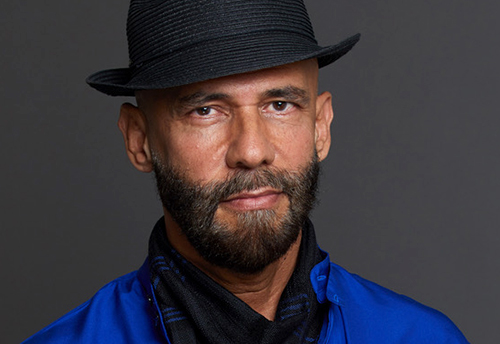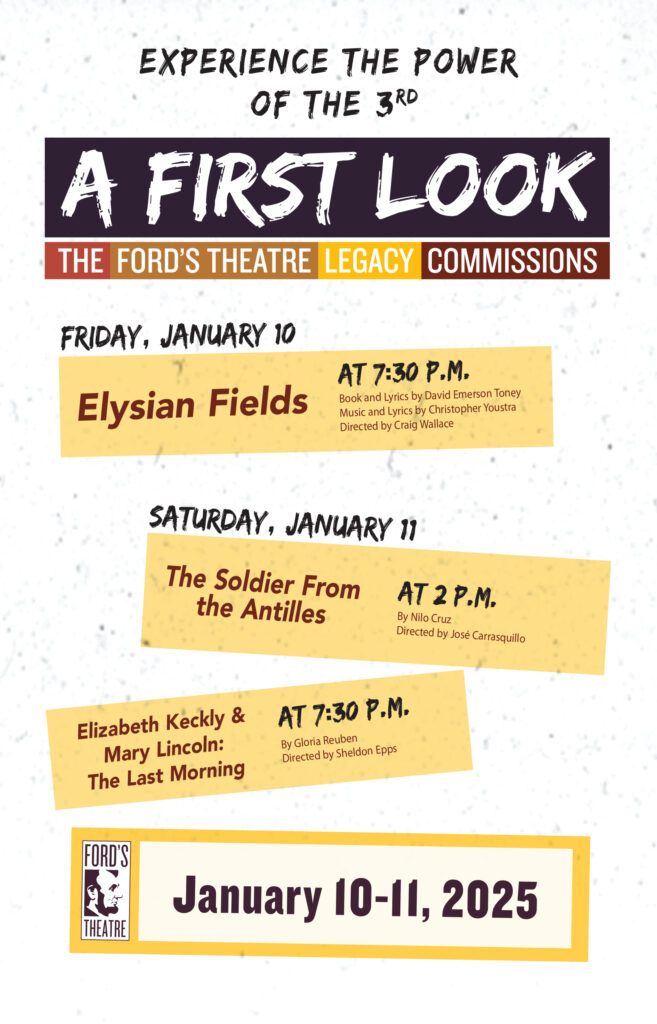
The Ford’s Theatre Legacy Commissions: A First Look – 2025
This free, two-day festival provides a preview of new plays in development with members of our cohort of playwrights in The Ford’s Theatre Legacy Commissions initiative, with opportunities for expanded conversations around the work.
The Ford’s Theatre Legacy Commissions is designed to serve as an artistic incubator for stories about unsung heroes responsible for changing the course of of civil rights and equality in American life. A First Look provides unique access to works in their early stages – seeing the process and hearing the voices that created and shape these stories.
In its third year, this festival will include the following readings: Elysian Fields, book and lyrics by David Emerson Toney, music and lyrics by Christopher Youstra and directed by Craig Wallace (Fences, Necessary Sacrifices, Death of a Salesman, The Guard, Driving Miss Daisy), a Ford’s Theatre Associate Artist; The Soldier From the Antilles by Nilo Cruz and directed by José Carrasquillo, director of artistic programming at Ford’s Theatre; and Elizabeth Keckly & Mary Lincoln: The Last Morning by Gloria Reuben and directed by Sheldon Epps (SHOUT SISTER SHOUT!; My Lord, What a Night; Twelve Angry Men).
Senior Artistic Advisor Sheldon Epps, Director of Artistic Programming José Carrasquillo and The Ford’s Theatre Legacy Commissions Advisor Sydné Mahone lead the initiative. Learn more about each play below.
Come for the reading, stay for the conversation. Each play reading will be directly followed by a post-show discussion with members of the creative team.
Meet and Mingle: Join us January 11 after the lights dim on stage at Ella’s Wood Fired Kitchen, 610 9th St. NW, Washington DC 20004 for an intimate post-show gathering after Saturday night’s reading of Elizabeth Keckly & Mary Lincoln: The Last Morning. Meet the playwrights from the A First Look festival, members of the creative teams and mingle with fellow theatre enthusiasts. Don’t miss this chance to be part of the artistic conversation! Explore the inspiration, themes and writing process behind these new works while sharing your thoughts and questions in a casual, engaging setting. This event is open to all A First Look ticket holders and will directly follow Saturday night’s post-show audience dialogue.

Elysian Fields
Book and Lyrics by David Emerson Toney; Music and Lyrics by Christopher Youstra; Directed by Craig Wallace
Public Reading: January 10, 2025 at 7:30 p.m.
In David’s Own Words:
Elysian Fields is a musical meditation on Shakespeare’s King Lear, that takes place in Reconstruction-era Alabama, post-Civil War. Seven years before the story begins, Hannibal Jenkins, the former owner of Elysian Fields, leaves his ten thousand acres of land to his eldest enslaved man, Bishop Carmichael, a plantation that now Bishop rules like a king. On the seventh anniversary of the inheritance, Bishop decides to divide the plantation among his three daughters: Delby (the youngest), Jindra (the middle daughter), and Nery (the eldest). The narrative of Elysian Fields tells the story of these three sisters and their father, Bishop, as they journey away from the dark secret of why Hannibal Jenkins, a man with unbridled hatred of his enslaved people, would leave his entire fortune to Bishop, and how that secret propels Bishop’s family through loss, faith, forgiveness, and redemption. It is not a story about slavery but an epic parable about the strength of ancestral love.
Artistic Team
Cast

The Soldier From the Antilles
by Nilo Cruz; Directed by José Carrasquillo
Public Reading: January 11, 2025 at 2 p.m.
In Nilo’s Own Words:
The play is set in a hospital in Alexandria, Virginia during the American Civil War, 1864. A nurse who has lost her husband in the war becomes a caretaker to the wounded. She tends to the patients, writes letters for them, and reads to them from the classics. While reading Frankenstein by Mary Shelley to a Union soldier afflicted by amnesia, Lottie seizes the conditions to make a new man—a being that can survive in an America who sees monsters in strangers and foreigners. But can the promise of this experiment be effective? What happens to the soldier from the Antilles when he is confronted by his brother, a Confederate warrior, who shares an honest reckoning with the past? Can they erase their past in an island where slavery and race hatred were also planted and took root? This play raises questions about love, guilt, and forgiveness, but is ultimately a much-needed story of hope, acceptance, and compassion. The Soldier from the Antilles is a stark reminder that there can be no reconciliation without a true and honest reckoning of the past. Only then can we hope to avoid repeating history and build a better future.
Artistic Team
Cast

Elizabeth Keckly & Mary Lincoln: The Last Morning
by Gloria Reuben; Directed by Sheldon Epps
Public Reading: January 11, 2025 at 7:30 p.m.
In Gloria’s Own Words:
Six weeks after President Lincoln is assassinated, Mary Lincoln, suffering from a crippling grief has ensconced herself in the Executive Residence. Elizabeth Keckly, a former slave who bought her own freedom and became a highly regarded modiste and dressmaker to Mary Lincoln during her years in the White House, temporarily closes her shop to spend as much time with Mary as possible. Elizabeth agrees to escort Mary back to Illinois when Mary acquiesces to vacate the White House so that President Johnson and his family can move in. The emotional bond that united these women began within a year of them knowing each other when they both lost a son. Although their upbringings could not have been more different, their emotional experiences were eerily similar. Knowing they might never have the chance to be alone again, I wanted to explore how these two strong women reconciled loss and tragedy while finding solace in what became a constant in their lives: their friendship.



